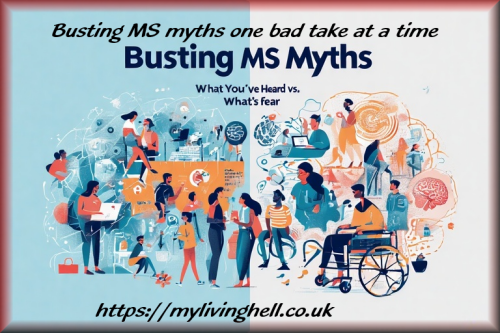- Posted on
Whether you’re newly diagnosed, living with MS for years, or just curious, you’ve likely heard some truly wild things about Multiple Sclerosis. So let’s bust some myths—because misinformation helps no one (and honestly, some of these are just rude).
- “MS is a death sentence.” Let’s start with the big one. No, MS is not fatal in most cases. MS itself doesn’t kill people—complications can, but with today’s medications, treatments, and support systems, people with MS are living longer, healthier lives. You die with MS, not because of it.
Think of MS like an annoying roommate, not a serial killer.
“Only older people get MS.” This one’s bizarrely persistent. MS is most often diagnosed in people aged 20 to 40, though it can affect children (pediatric MS) and older adults too. But it’s definitely not an “old person’s disease.” Most of us are young(ish), trying to adult, work, date, raise kids, and live our lives—with the occasional brain fog or numb leg thrown in.
“Everyone with MS ends up in a wheelchair.” This is the fear-myth people love to whisper. Here’s the truth: most people with MS do not end up in a wheelchair. Some do, yes, especially if the disease is aggressive or untreated—but with modern meds, assistive devices, and PT, many remain mobile. And if you do use a chair? That doesn’t mean you’re “worse” or “losing.” It means you’re adapting, surviving, and still rolling forward (literally).
“MS is contagious.” Nope. You can’t catch it from someone, no matter how close you get. Hugs, kisses, shared drinks—zero risk. MS is an autoimmune disease, not an infection. So go ahead, be affectionate. Just don’t steal our snacks. That might be a problem.
“You don’t look sick, so you must be fine.” Cue the internal scream. MS comes with a host of invisible symptoms: fatigue, brain fog, pain, tingling, heat intolerance, vision issues. You might see someone laughing at brunch or walking the dog and assume they’re fine. What you don’t see is them lying in bed for hours afterward, trying to recover.
Looking good ≠ feeling good. Don’t judge the book by its mascara and yoga pants.
- “MS always gets worse.” MS progression varies wildly. Some people have a relapsing-remitting course with long stretches of stability. Others have more progressive forms. But thanks to disease-modifying therapies (DMTs) and early diagnosis, many people live for decades with manageable symptoms.
Progression is not a guarantee—it’s a possibility, not a prophecy.
“It’s all in your head.” Well, kind of… but not in the way people mean. MS affects the central nervous system—the brain and spinal cord. So yeah, it is in your head (and spine). But that doesn’t mean it’s imaginary or psychological. It’s a real, physical disease with real physical consequences. Gaslighting people with chronic illness? That’s the real sickness.
“You’ll have to give up your career/life/fun.” MS might require some adjustments, but it does not mean giving up on your dreams. Many people with MS work full-time, raise kids, travel, compete in sports, write blogs (hey!), and live vibrant lives. You might need flexible hours or extra naps, but the fun doesn't stop—just evolves.
“MS is the same for everyone.” Biggest myth of all. MS is wildly unpredictable. One person may deal mostly with fatigue and vision issues, another may struggle with mobility or speech. Even the same person can experience different symptoms over time. That’s why it’s called “the snowflake disease”—no two cases are exactly alike.
“If you just eat right / do yoga / stay positive, you’ll be cured.” Look, lifestyle changes can help. Diet, movement, and mindset can make a big difference in managing MS. But there is no cure—yet. Telling someone they can “heal” with green juice and affirmations is dismissive and misleading. MS isn’t about “thinking yourself better.” It's about managing a complex condition the best you can.
Self-care is great. Snake oil? Not so much.
🛑 Final Thoughts: Living with MS means navigating not just the disease, but the narratives around it. Busting these myths doesn’t just help us advocate for ourselves—it helps the people around us understand, empathize, and stop saying ridiculous things at parties.
Got a myth you’ve heard that made your eye twitch? Drop me an email sick@mylivinghell.co.uk —maybe I’ll do a Part 2. “Life is funnier without the noise. Weirder too. But it’s mine now.”
“The views in this post are based on my personal
experience. I do not intend harm, only honesty.”
“By ink and breath and sacred rage, I write.
By storm and silence, I survive.”

🧌✨ @goblinbloggeruk ✨🧌